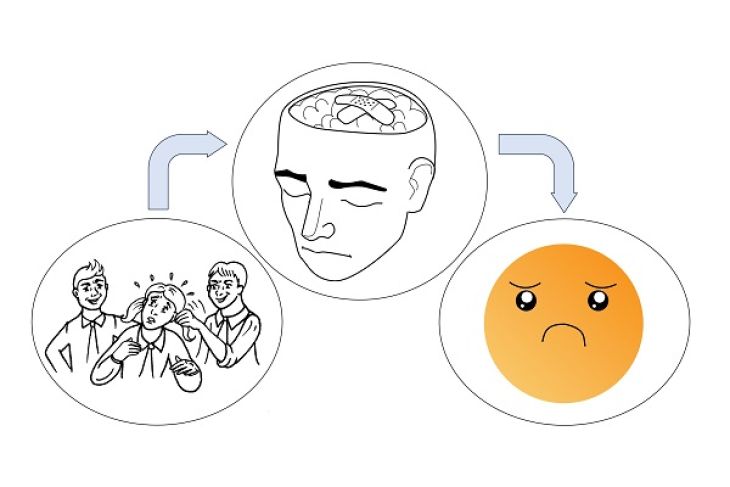
Researchers have found that adolescents being bullied by their peers are at greater risk of the early stages of psychotic episodes and in turn experience lower levels of a key neurotransmitter in a part of the brain involved in regulating emotions. The finding suggests that this neurotransmitter — a chemical messenger that transmits nerve impulses for communication by a nerve cell — may be a potential target for pharmaceutical interventions aimed at reducing the risk of psychotic disorders.
Psychosis is a mental state characterized by loss of contact with reality, incoherent speech and behavior, and typically hallucinations and delusions seen in psychiatric disorders such as schizophrenia.
Recent studies investigating links between neurological and psychiatric features of certain disorders have found that individuals who experience their first episode of psychosis or have schizophrenia that remains treatable, have lower-than-normal levels of glutamate, a neurotransmitter in the brain’s anterior cingulate cortex (ACC) region. The ACC is known to play a crucial role in regulating emotions, decision-making and cognitive control, while glutamate is the most abundant neurotransmitter in the brain and is involved in a wide range of functions, including learning, memory and mood regulation.
Alterations in glutamate levels have been implicated in various psychiatric disorders, including schizophrenia, depression and anxiety, and so measuring ACC glutamate levels can provide valuable insights into the mechanisms of the nervous system underlying these disorders and their treatment.
However, until now, changes in glutamate levels in the ACC in those individuals at high risk of psychosis, and the relationship between this and the effects of bullying in adolescents has remained unclear.
And so researchers at the University of Tokyo used magnetic resonance spectroscopy, or MRS, a type of radiological imaging applied to depict brain structure and function, to measure glutamate levels in the ACC region of Japanese adolescents. They then measured the glutamate levels at a later point, allowing them to assess changes over time, and compare these changes to experiences with bullying or lack thereof, as well as with any intention on the part of those experiencing bullying to seek help.
Bullying victimization was tracked via questionnaires completed by the adolescents. The researchers then used formalized psychiatric measurement to assess experiences of bullying victimization based on those questionnaires, such as tallying the frequency and assessing the nature of events involving physical or verbal aggression, and also capturing their impact on overall mental health.
They found that bullying was associated with higher levels of subclinical psychotic experiences in early adolescence — those symptoms come close to psychosis but do not meet the full criteria for a clinical diagnosis of a psychotic disorder, such as schizophrenia. These symptoms or experiences can include hallucinations, paranoia or radical alterations in thinking or behavior and can have a significant impact on well-being and functioning, even in the absence of a psychotic disorder diagnosis.
“Studying these subclinical psychotic experiences is important for us to understand the early stages of psychotic disorders and for identifying individuals who may be at increased risk for developing a clinical psychotic illness later on,” said Naohiro Okada, lead author of the study and project associate professor at the University of Tokyo’s International Research Center for Neurointelligence (a research center under Japan’s World Premier International Research Center Initiative program).
Crucially, the researchers found that higher levels of these subclinical psychotic experiences were associated with lower levels of anterior cingulate glutamate in early adolescence.
“First and foremost, anti-bullying programs in schools that focus on promoting positive social interactions and reducing aggressive behaviors are essential for their own sake and to reduce the risk of psychosis and its subclinical precursors,” said Okada. “These programs can help create a safe and supportive environment for all students, reducing the likelihood of bullying and its negative consequences.”
Another potential intervention is to provide support and resources for adolescents who have experienced bullying victimization. This might include counseling services, peer support groups and other mental health resources that can help adolescents cope with the negative effects of bullying and develop resilience.
While Okada’s group has identified a potential target of pharmacological interventions, he added that nonpharmacological interventions such as cognitive behavioral therapy or mindfulness-based interventions may also serve to target this neurotransmitter imbalance.







